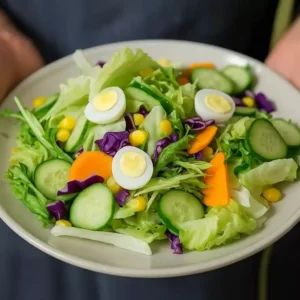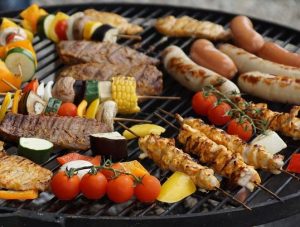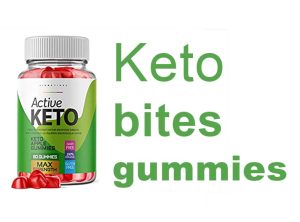
Have you ever wondered why some people seem to have endless energy while others feel drained no matter how much they eat? A few years ago, I was one of those people who constantly felt sluggish despite eating three meals a day. The truth is, not all calories are created equal. The secret lies in nutrient dense foods—foods packed with vitamins, minerals, and antioxidants that fuel your body without the empty calories.
Nutrient dense eating isn’t about restriction; it’s about choosing smarter. It’s about giving your body what it truly needs to thrive—energy, immunity, and resilience for the long haul.
What Are Nutrient Dense Foods and Why Do They Matter?
Understanding Nutrient Density
Nutrient density refers to how many beneficial nutrients a food provides compared to its calorie content. A small serving of kale or salmon, for instance, offers far more essential nutrients than an entire bag of chips. These foods provide a powerful dose of vitamins, minerals, and antioxidants that support energy, immunity, and long-term health.
| Food Type | Calories (per 100g) | Nutrient Density Score | Example Nutrients |
|---|---|---|---|
| Kale | 35 | 98 | Vitamin K, Vitamin C, Iron |
| White Bread | 265 | 15 | Minimal nutrients |
| Salmon | 208 | 90 | Omega-3, Protein, Vitamin D |
The Science Behind Nutrient Density
Research from the Harvard T.H. Chan School of Public Health and the USDA confirms that foods high in nutrient density improve overall wellness. They reduce oxidative stress, regulate metabolism, and support the immune system by providing essential micronutrients like magnesium, iron, and vitamin B12.
Why Nutrient Dense Foods Matter
Eating nutrient dense foods boosts your energy naturally, strengthens your immune defenses, and supports a longer, healthier life. They help balance hormones, reduce inflammation, and keep your metabolism running smoothly.
Top Nutrient Dense Foods for Sustained Energy
Lean Proteins and Omega-3 Powerhouses
Foods like salmon, eggs, and Greek yogurt are essential for sustained energy. Rich in protein and omega-3 fatty acids, they help repair muscles, support brain function, and maintain steady energy levels throughout the day.
Energy-Boosting Examples:
- Salmon: High in omega-3s for brain and heart health.
- Eggs: Excellent source of complete protein and B vitamins.
- Chia Seeds: Packed with fiber, healthy fats, and antioxidants.
| Food | Protein (g/100g) | Omega-3 (mg) | Energy Benefit |
|---|---|---|---|
| Salmon | 20 | 2260 | Long-lasting energy |
| Eggs | 13 | 37 | Improves focus and metabolism |
| Chia Seeds | 17 | 17800 | Stabilizes blood sugar |
Whole Grains and Complex Carbohydrates
Unlike refined carbs, whole grains release energy slowly, helping you stay alert and satisfied longer. Quinoa, oats, and sweet potatoes provide complex carbohydrates and fiber that prevent fatigue and maintain stable glucose levels.
Smart Snacks for Busy Days
If you often feel that afternoon slump, try nutrient dense snacks like almonds, pumpkin seeds, or a banana with nut butter. These foods balance blood sugar and provide quick but steady energy.
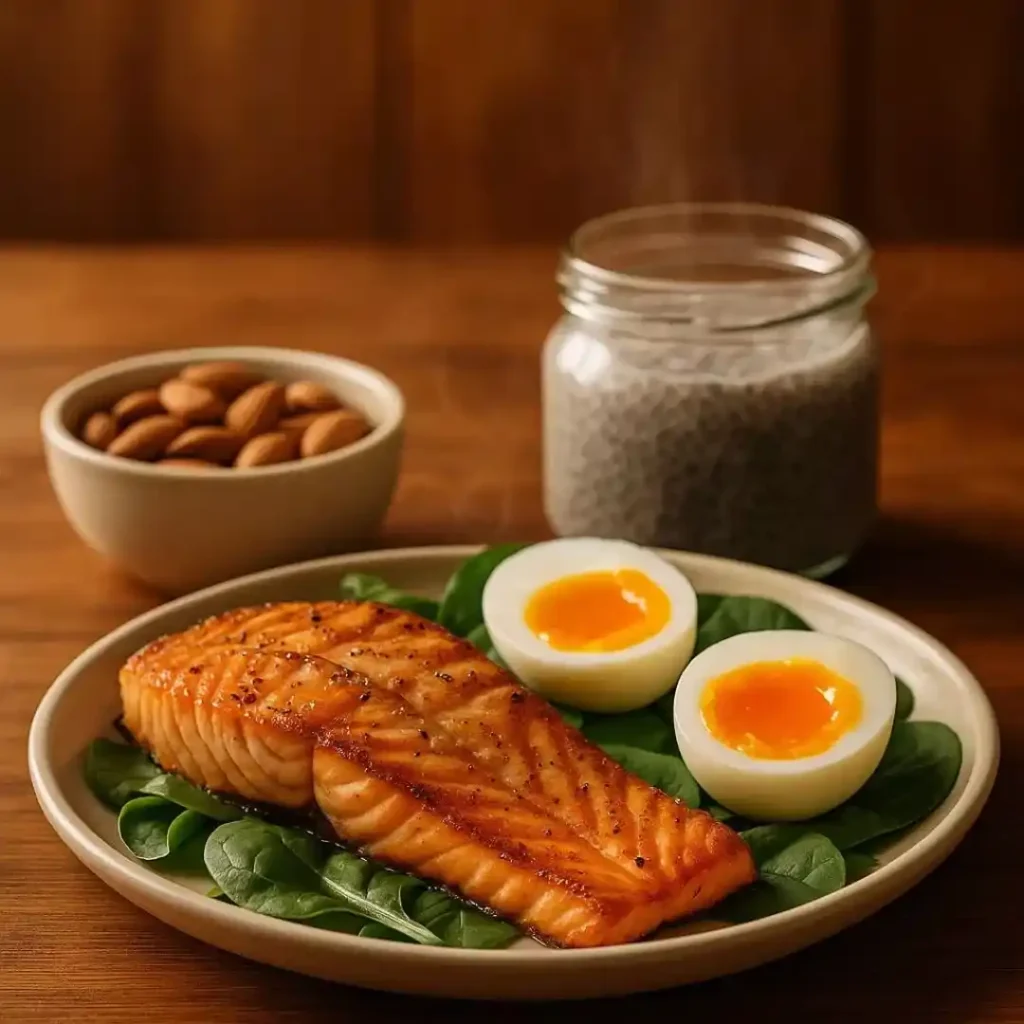
Nutrient Dense Foods That Strengthen Immunity
Vitamin C and Antioxidant-Rich Superfoods
Citrus fruits, berries, and cruciferous vegetables like broccoli and kale are superfoods loaded with antioxidants that neutralize free radicals. According to the National Institutes of Health, Vitamin C is vital for immune cell production and repair.
Gut-Healthy Foods for Immune Support
A healthy immune system begins in the gut. Probiotic-rich foods such as Greek yogurt, kefir, and fermented vegetables help maintain a balanced gut microbiome, which strengthens immune response and improves digestion.
Zinc and Iron-Rich Foods
Spinach, lentils, and pumpkin seeds supply zinc and iron—two nutrients crucial for immune function and energy transport. Zinc helps produce immune cells, while iron supports oxygen circulation, keeping you active and alert.
The Longevity Diet: Eating for a Healthier Future
Anti-Inflammatory Superfoods
Chronic inflammation contributes to aging and disease. Foods like turmeric, garlic, and ginger contain natural anti-inflammatory compounds that help protect your cells. Green tea is another powerful longevity drink known for its antioxidants.
Healthy Fats for Heart and Brain Health
Avocados, olive oil, and nuts offer monounsaturated fats that support heart and cognitive health. Regular consumption of omega-3-rich foods like salmon also lowers inflammation and improves brain performance.
Dark Leafy Greens and Cruciferous Vegetables
Kale, spinach, and brussels sprouts are the ultimate longevity boosters. They contain vitamins K, A, and folate, supporting bone strength, vision, and cognitive function.
| Vegetable | Vitamin K (µg/100g) | Iron (mg) | Health Benefit |
|---|---|---|---|
| Kale | 817 | 1.5 | Improves bone health |
| Spinach | 483 | 2.7 | Boosts oxygen levels |
| Broccoli | 101 | 1 | Supports immunity |
How to Build a Nutrient Dense Meal Plan
The 50-25-25 Rule
A well-balanced plate includes:
- 50% colorful vegetables and fruits
- 25% lean proteins
- 25% complex carbohydrates
| Meal | Example | Key Nutrients |
|---|---|---|
| Breakfast | Greek yogurt with berries and chia seeds | Protein, antioxidants |
| Lunch | Quinoa bowl with grilled salmon | Omega-3, fiber |
| Dinner | Chicken stir-fry with broccoli | Iron, vitamin C |
Smart Shopping Tips
When grocery shopping, focus on whole, minimally processed foods. Choose seasonal produce, read ingredient labels, and avoid items with added sugars or preservatives.
Simple Meal Prep Ideas
Batch-cooking nutrient dense meals helps you stay consistent. Prepare overnight oats for breakfast, grilled chicken bowls for lunch, and baked fish with veggies for dinner.
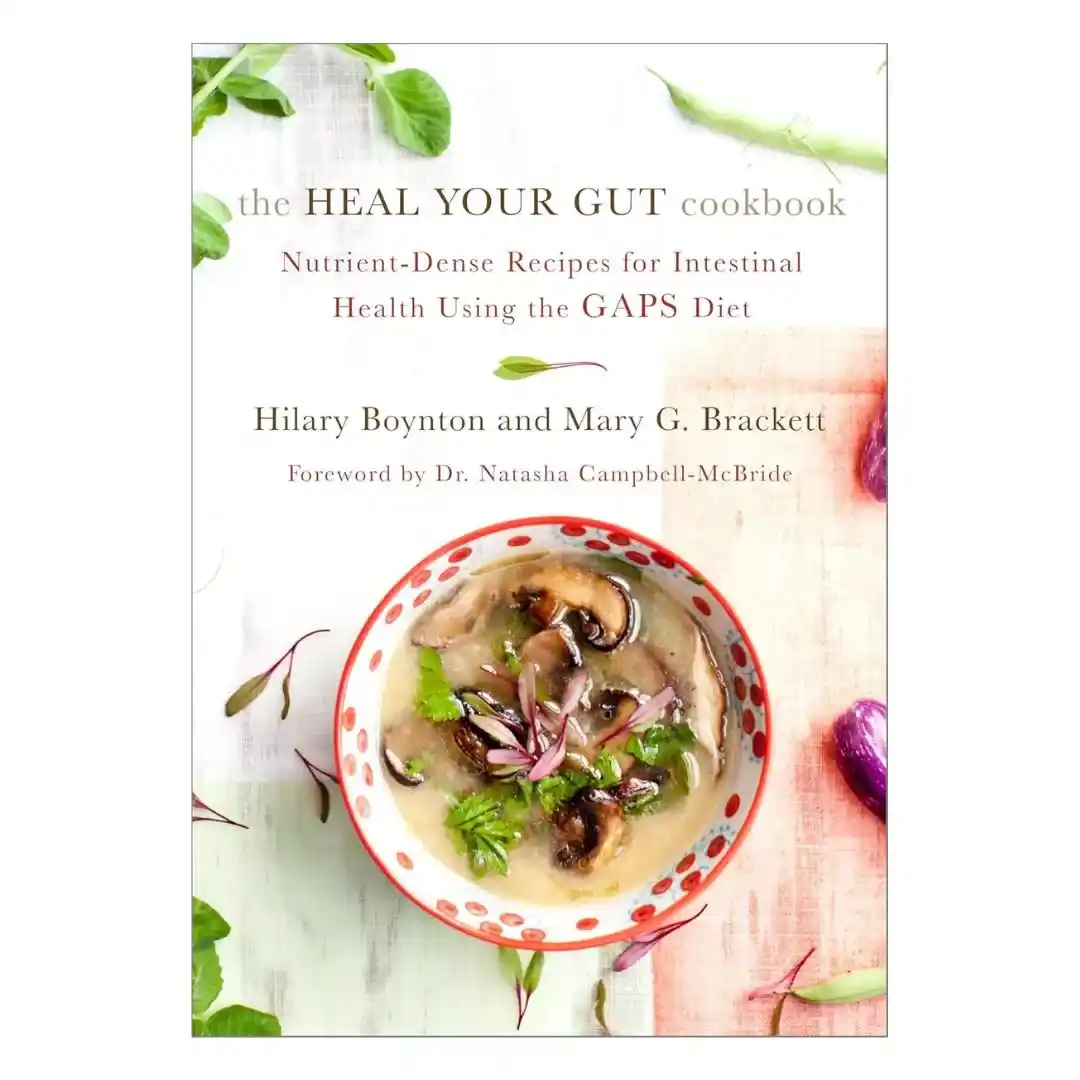
Nutrient-Dense Recipes for Intestinal Health Using the GAPS Diet
FAQs About Nutrient Dense Foods
What are nutrient dense foods?
Nutrient-dense foods provide a high amount of vitamins, minerals, and other beneficial compounds relative to their calorie content. They are the opposite of “empty-calorie” foods. Examples include leafy greens (spinach, kale), lean proteins (salmon, chicken breast), whole grains (quinoa, oats), and colorful vegetables like bell peppers and sweet potatoes.
What is the most nutrient dense food?
While no single food is perfect, animal liver (especially beef liver) is frequently cited as the most nutrient-dense food on the planet. It is an exceptionally rich source of vitamin A, B12, iron, copper, and high-quality protein, all in a highly bioavailable form.
Which food has all 13 vitamins?
No single whole food naturally contains all 13 essential vitamins. However, salmon is one of the most complete, providing a wide range, including D, B12, B6, and E. To get all 13, you need a varied diet. For example, combining salmon (rich in many B vitamins and D) with nuts (for Vitamin E) and citrus fruits (for Vitamin C) covers the spectrum.
What food adds 33 minutes to your life?
This comes from a 2021 University of Michigan study. A peanut butter and jelly sandwich was calculated to provide roughly 33 minutes of “healthy life.” The nuts in the peanut butter offer healthy fats and protein, which are linked to positive health outcomes. It’s a model-based estimate to compare foods, not a precise life-extension guarantee.
Final Thoughts: Nourish Your Life with Nutrient Dense Choices
Food is more than fuel—it’s medicine for your mind and body. Incorporating nutrient dense foods into your diet can help you live with more energy, fewer illnesses, and greater vitality. Start small, one meal at a time, and notice how your body responds. With consistency, nutrient dense eating will become second nature and your best investment in lifelong health.
If you’re ready to take the next step, explore curated nutrient dense meal kits and supplements that align with your wellness goals.
This post may contain affiliate links. If you make a purchase through these links, I may earn a small commission at no additional cost to you. I only recommend products I personally trust and believe add value to your health and well-being.


